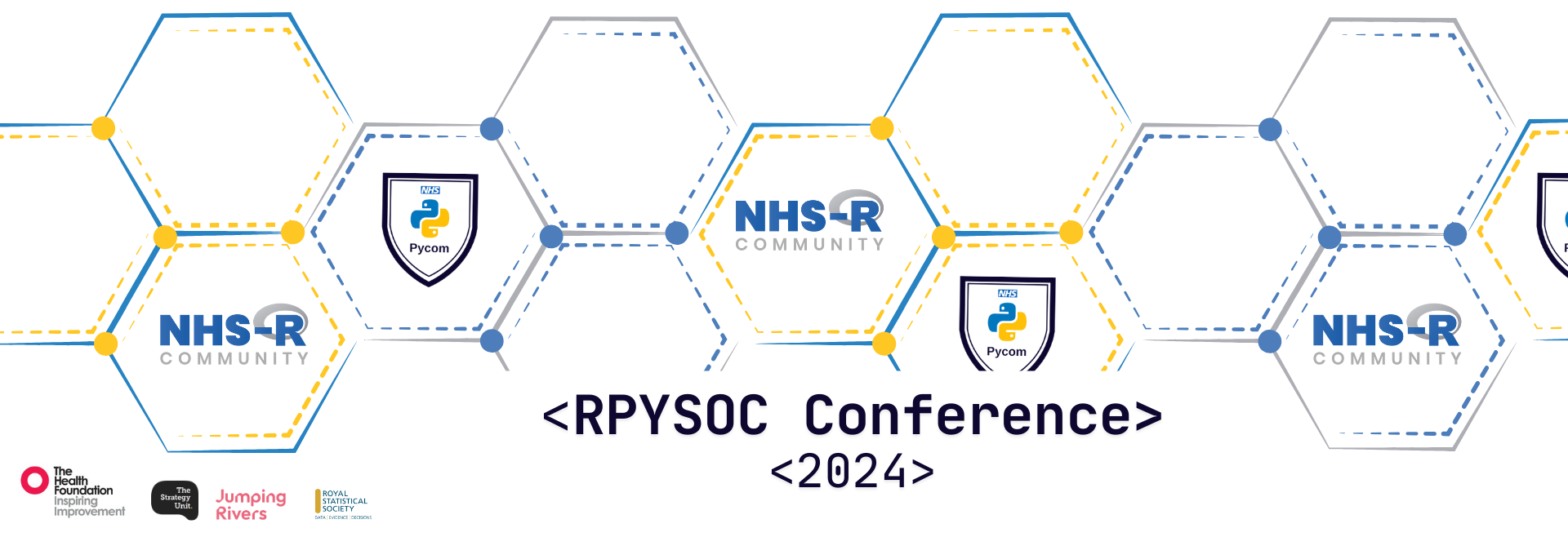fixed_points <- c(
"Break",
"Lunch",
"Registration and coffee",
"Welcome and Housekeeping",
"Closing of day"
)
tibble::tribble(
~Time, ~Title, ~Speaker,
"09:00 – 09:45", "Registration and coffee", "",
"09:45 – 09:55", "Welcome and Housekeeping", "Zoë Turner",
"09:55 – 10:20", "RAPping my head against a databricks wall", "Louise Schreuders",
"10:20 – 10:35", "Reducing mental health inequalities among the BAME residents of Herefordshire and Worcestershire communities", "Oluwatimilehin Olabamiyo",
"10:35 – 11:00", "Simplifying development of AI applications integrated in EHRs with Health Chain", "Jennifer Jiang-Kells",
"11:00 – 11:15", "Beyond the dashboard: R for value added insights", "Nicola Farthing",
"11:15 – 11:45", "Break", "",
"11:45 – 12:00", "Reimagining NHS dashboards: an open-source approach with plotly-dash", "Jennifer Struthers",
"12:00 – 12:25", "Using Machine Learning and secondary care activity data to identify risk of cancer earlier", "Scarlett Kynoch",
"12:25 – 12:40", "The patient does not exist – generating synthetic patient data with Wasserstein GAN", "Simon Newey",
"12:40 – 13:05", "Streamlining machine learning development at the NHS via open-source tools", "Elias Altrabsheh and James Sibbit",
"13:05 – 13:07", "rainbowR", "Ella Kaye",
"13:07 – 13:55", "Lunch", "",
"13:55 – 14:10",
"What insights did Glasgow Scottish Ambulance Service (SAS) gain from combining multiple data sources about all chest pain patients from 2023? We'll present about the process and findings of a 1-year long MSc dissertation project.", "Katalin Koszegi",
"14:10 – 14:25",
"Predictive Modelling for health and social care capacity planning using open data", "Sebastian Fox",
"14:25 – 14:50", "To explain or predict: how different modelling objectives change how you use the same tools", "Chris Mainey",
"14:50 – 15:05", "Using Openxlsx2 to automate excel publications", "Ruth Keane",
"15:05 – 15:35", "Break", "",
"15:35 – 15:50", "What I learnt about (programming) languages by building bilingual websites", "Rosemary Walmsley",
"15:50 – 16:15", "Leveraging R to implement novel theoretical development in online ‘digital twin' simulation modelling", "Richard Wood",
"16:15 – 16:30", "Should I use your package", "Colin Gillespie",
"16:30 – 16:45", "Cracking open the TiN: how we build a one-stop statistics website using R, GitHub and BigQuery", "Mohan Del",
"16:45 – 17:10", "Closing of day", ""
) |>
gt::gt() |>
gt::cols_width(
Time ~ px(110),
Title ~ px(500),
Speaker ~ px(150)
) |>
gtExtras::gt_highlight_rows(rows = Title %in% fixed_points)
